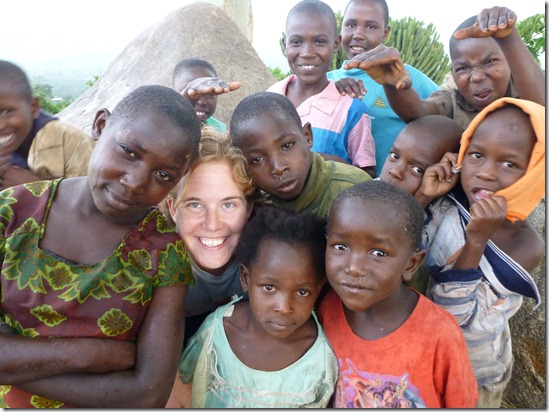Every little girl dreams about falling in love. But I never thought that my first love would be a continent. I’ve been in Africa for sixteen days, and I’ve seriously fallen in love with this place. I love the green hilly landscape of southern Kenya, the deep rich color of the skin of African people and the sing-song language of Swahili. My favorite thing is how worshipping Jesus here is more like a party than a church service.
Here is our team striking a pose at The Rocks, which became our favorite place to watch the sunset: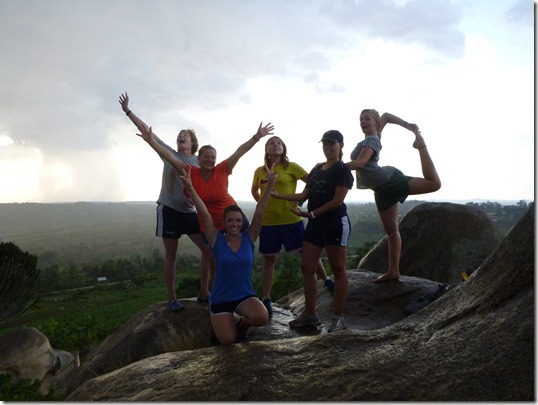
And here is the beautiful African savannah (Can you find Peace running down the hill?)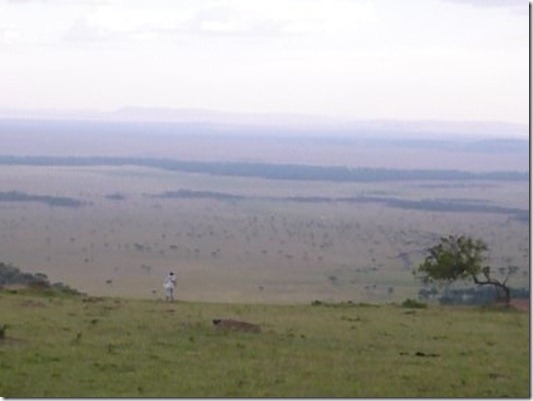
But there is one thing about Africa that still mystifies me. Nearly the moment I walk outside the gate of our house, a pervasive chorus fills my ears: “Mzungu! Mzungu!” I turn into a “come and get me” target with dozens of small scantily clothed children sprinting towards me, their feet pattering on the reddish brown dirt.
Here is a photo from a group of us making faces after being caught in the rain: 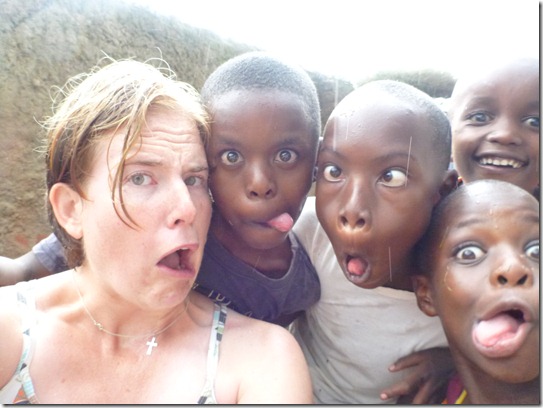
If you’ve never visited Africa, you’ll find out quickly that Mzungu is Swahili for “White person.” The question I have is: how do you respond to someone who yells at you, “White person?” Imagine walking down the street, as people state the obvious back at you, saying “Tall girl!” or “Blond hair!” or “Cracked tooth!” How would you respond?
I’ve come up with three options:
1. Wave and smile. This is usually my favorite option as it minimizes verbal communication and yet communicates friendliness. The “Queen Elizabeth” hand wave usually works quite well.
2. Say, “Jambo! Habari?” (Swahili for “Hi! How are you?”) Note that this can be a bit awkward if you are yelling across the street. If you go this route, take caution as the other party may assume you can speak fluent Swahili. If this happens, just nod and smile and say “Ehh” until they finish.
3. Ignore the comments and continue walking straight. This option is not for people with sensitive ears, as usually the other party will assume that you can’t hear them and respond by yelling “Mzungu!” louder. My recommendation is to use this option sparingly, as it feeds into the stereotype of Americans being stingy and closed off from the rest of the world.
After the word “Mzungu,” you often hear “How are you?” In fact, the two often are coupled together, creating a sort of a sing-song rhyme that children shout out along the streets: “Mzungu! How are you? Mzungu! How are you?”
One thing you should know is that “How are you?” in Africa doesn’t actually mean “How are you?” It’s more of a statement than a question – what they actually mean is “How are you.” It’s a greeting, but they don’t actually expect you to respond.
I found that out the other day when a dozen African children sat on the ledge, saying, “Mzungu! How are you?”
I responded “Fine.” They came back with, “How are you? How are you? How are you?” Thinking they didn’t hear me, I replied again, a little louder, “I’m doing good. How are you?” And they replied again, “How are you?”
So if you ever come to Africa as a Mzungu, don’t expect to tell people how you’re doing. A good technique is just to smile and nod. I learned that from a Friends episode and it’s never failed me.
The final question you might get is, “Give me money.” Now this is a difficult one. It’s so hard to say “no” when there is a little African girl standing in front of you, her little brown toes extending beyond her broken flip-flops, hands held out and big white eyes gazing up at you.
I’ve tried to explain that I’m a missionary, and I’m not actually rich like the African children believe that all mzungus are. Or am I? I try to ignore the fact that there is an ipod in my pocket and a laptop in my room, things that many Africans would never even dream about owning. So you’re left in a hard spot. If you give money, then you feed into the stereotype that white people are actually rich and are there to give things. Plus, you never know where the money ends up. So I decided that a better option than giving money away would be to buy something tangible for someone to bless them, whenever the opportunity presented itself.
No more than an hour afterwards, a girl which I have seen around our place a few times asked me to buy her some molasses so she could make cookies. The store didn’t have molasses, so she asked if I could buy some bread, and I agreed. After I paid for the bread, she turned around and gave out the eleven little bread balls to all the African children that we were playing with.
Here is a picture of the two of us: 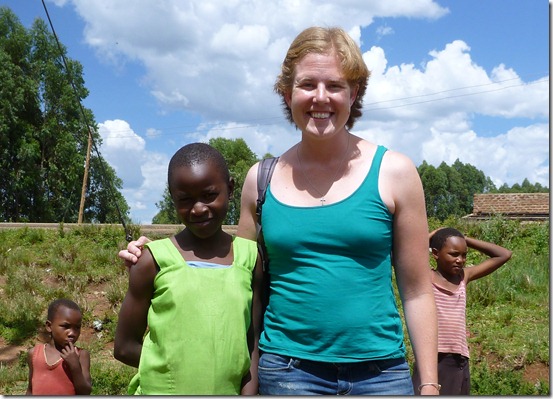
I was blown away. Here in Africa, what is mine is yours, and what is yours is mine. This is actually something that characterized the very first Christian Church: “And the congregation of those who believed were of one heart and soul; and not one of them claimed that anything belonging to him was his own, but all things were common property to them.” (Acts 4:32) I also bought a soda for another young girl, and after a few sips, she gave the rest of it to two other young boys who follow me around and never cease to have snot crusted dripping from their noses.
I always thought that if you didn’t have much, you would grab ahold of anything that you’re given and never let it go. But I’m learning that when you don’t have much, you also don’t have much to lose, so you might as well give it away to others that are in the same boat.
Sometimes I wish I could just walk around with invisible skin. Yet the blatent fact stares me in the face every day: I’m white. And everyone else is black. I’ve never been a minority, but I’m learning that although minorities in America are often discriminated against, here there is almost a reverse-racism where people crowd around us mzungus, rubbing our skin and running their fingers through our hair as if it were made of gold.
In fact, this morning as we walked by the window of a school, the screaming that erupted was reminiscent of teenagers at a Justin Bieber concert. We had to literally pull the children off of us when it was time to leave. So if you’ve ever wanted to be a celebrity, just come to Africa and you will be treated as one just based on the color of your skin. 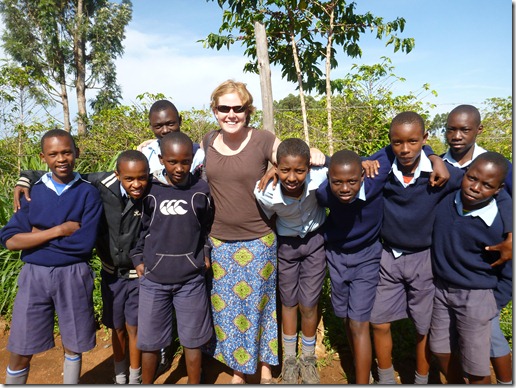
Yet something about this feels incredibly…wrong. Don’t people here understand that we actually are exactly alike on the inside? Black skin or white skin, it’s just…skin. All this being said, I’m still left with the question – what can be done to reduce the distinction between black and white? Only love…
One evening, after they had killed and cooked a chicken for us, Pastor Abraham and his family were shocked when we offered to switch meals. We chose to eat his family’s ugali (maize cake) and steamed greens while they ate the chicken, potatoes and cabbage they had cooked for us. We found out later that the only time that they eat chicken is at Christmas. It was so awesome to serve them this way, and he kept remarking how he didn’t know that white people could, in fact, eat ugali. 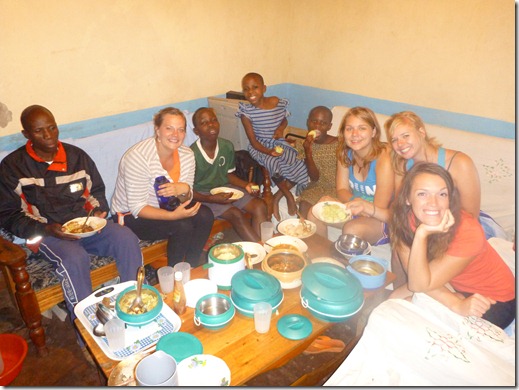
Not only this, but Pastor Abraham and his family moved out of half of their home and hired women to cook and clean for the time that our team is here. He told us that we are the first team to help out with the daily chores: pulling up buckets of water from the well, doing the dishes, and sweeping. He said that it makes him feel like we are one of them.
I wanted to say, but we are. We are one of you. We are in Africa, and we are Mzungus 